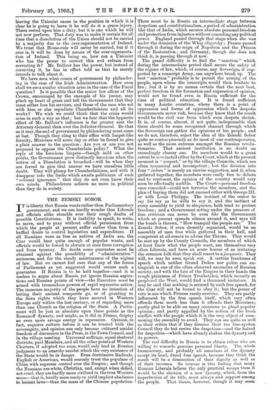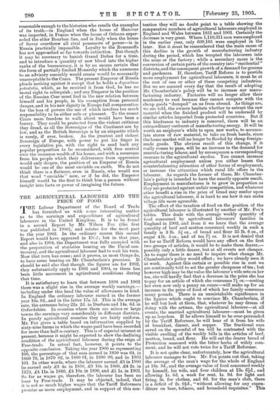I T is liberty that Russia wants rather than Parliamentary government,
and we can hardly wonder that Liberals and officials alike stumble over their rough drafts of possible Constitutions. It is inability to speak, to write, to move, and to pray without official permission from which the people at present suffer rather than from a baffled desire to control legislation and expenditure. If all Russians were as free as natives of India are, the Czar would hear quite enough of popular wants, and officials would be forced to abstain at once from corruption and from tyranny. No doubt some guarantee must be obtained against the possibility of " administrative " sentences, and for the steady maintenance of the regime of law. But we cannot feel sure that any of the forms of Parliament as yet suggested would secure such a guarantee. If Russia is to be held together—and it is useless to argue about Russia yet ignore Russian aspira- tions and Russian points of view—the Executive must be armed with tremendous powers of rapid repressive action. The immense majority of the people have no intention of letting their ancient conquests go, or of granting to the Jews rights which they have secured in Western Europe only within the last century, or of regarding more than one Church as the religion of the State. A Parlia- ment will be just as absolute upon these points as the Romanoff dynasty, and might, as it did in France, display an even more savage energy in repression. Opinion, in fact, requires culture before it can be trusted with the sovereignty, and opinion can only become cultured amidst freedom of discussion in the Press, in the Town Council, and in the village meeting. Universal suffrage, equal electoral districts, paid Members, and all the other points of Western Charters, if adopted too soon, would only lead in Russian judgment to an anarchy amidst which the very existence of the State would be in danger. Even doctrinaire Radicals, English or American, would scarcely trust the populace of China with supreme control over the Empire ; and though the Russians are white, Christian, and, except when defied, not cruel, they are hardly more civilised in the true Western sense—that is, hardly more ready to yield implicit obedience to lenient laws—than the mass of the Chinese population. There must be in. Russia an intermediate stage between despotism and constitutionalism, a period of administration like that of India, which secures absolute personal freedom and protection from injustice without conceding any political power. England passed through that stage when she was under the dominion of the Whig oligarchy ; France passed through it during the reign of Napoleon and the Princes of the Restoration • and Germany, though she does not think it, is passing ihrough it now.
The grand difficulty is to find the " sanction " which during the intermediate period. shall secure the safety of the regime of law, which, of course, any Sovereign, if sup- ported by a conscript Army, can anywhere break up. The best " sanction " probably is to permit the arming of the people, upon whom the conscripts would then hesitate to fire ; but it is by no means certain that the next best, perfect freedom in the formation and expression of opinion, would not be found even in Russia sufficient for the time of political education. It is found sufficient in many Asiatic countries, where there is a point of oppression and forms of oppression which the despotic Governments never risk, because they know that the result would be the civil war from which even despots shrink. It is, of course, almost, if not quite, indispensable that there should be some recognised channel through which the Sovereign can gather the opinions of his people ; and we do not, therefore, reject the idea of the Zemski Sobor quite so contemptuously as do most of our contemporaries, as well as the more extreme amongst the Russian revolu- tionaries. That ancient institution is no doubt an exceedingly clumsy one. Its members would to a great extent be nominated either by the Court, which at the present moment is " suspect," or by the village Councils, which are often tyrannical and incompetent ; but the division into four " orders " is merely an unwise suggestion, and if, when gathered together, the members were really free to debate and to represent, the opinion of the country would very soon be effectually audible. The Court—personal freedom once conceded—could not terrorise the members, and the plan of buying them did not succeed either with George III. or with Louis Philippe. The instinct of the orator to say his say as he wills to say it, and the instinct of every assembly to yield to eloquence, both tend to protect freedom ; and a Government acting under the pressure of free criticism can never be even like the Government which at present spreads silence around it, and says till the bomb is thrown, " How tranquil the people are." The Zemski Sober, if even decently organised, would be an assembly of men free while gathered in their hall, and competent at all events to advise the Throne. They would be sent up by the County Councils, the members of which at least know what the people want, are themselves very often Liberals, and have an acute horror of so irritating the common folk that they shall resort to a jacquerie. They will, we may be sure, speak out. A certain frankness of speech which neither Grand Dukes nor police can ex- tinguish is one of the often observed anomalies of Russian society, and with the fate of the Empire in their hands the rough plainness of Prince. Troubetzkoi, which recently so perplexed the West, would find a thousand imitators. It may be said that nothing is secured by such free speech, for the Czar will not be bound to obey it ; but the power of veto is one which Princes rarely exercise. They are partly influenced by the free speech itself, which very often. offends them much less than it offends their Ministers; partly glad to be able on many occasions to plead popular opinion ; and partly appalled by the notion of the fresh. conflict with the people which it is the very object of sum- moning the assembly to avoid. They can see quite as well as their critics that if they dismiss their too free-spoken Council they do but revive the despotism—and the hatred for despotism—which have already shaken the dynasty and its powers.
The real difficulty in Russia is to obtain rulers who are willing to concede genuine personal liberty. The whole bureaucracy, and probably all members of the dynasty except its head, dread free speech, because they think the result will be a diminution of their dignity as well as of their incomes. So intense is this feeling that many Russian Liberals believe the only practical escape from it would be the election of a new dynasty, which, from the imperfection of its title, must always seek support among the people. That thesis, however, though it may seem reasonable enough to the historian who recalls the examples of its truth—in England when the house of Hanover was imported, in France when the house of Orleans super- seded the elder Bourbon line, and in Italy when the house of Savoy overthrew all rival possessors of power—is in Russia practically impossible. Loyalty to the Romanoffs has not approached so far towards extinction. But though it may be necessary to banish Grand Dukes for a time, and to introduce a quantity of new blood into the higher ranks of the bureaucracy, it is by no means certain that the form of partially limited Monarchy which the summons to an advisory assembly would create would be necessarily unacceptable to the Czars. The present Emperor of Russia pleads nothing against it except that he holds a depositum potestatis, which, as he received it from God, he has no moral right to relinquish ; and any Emperor in the position of the Russian Czar must find in the new relation between himself and his people, in his exemption from personal danger, and in his new dignity in Europe full compensation for the loss of powers the use of which involves too much responsibility to be either safe or pleasant. To the recent Czars mere freedom to walk about would have been a luxury. They could be protected from the violent criticism they dread, as all the Sovereigns of the Continent are by law, and as the British Sovereign is by an etiquette which is rarely, if ever, broken. As the greatest and richest Sovereign of Europe, with power to put his finger in every legislative pie, with the right to send back any popular proposition to be reconsidered, with free control over the immense wealth of his house, and with a reverence from his people which their deliverance from oppression would only deepen, the position of an Emperor of Russia would be one of the most enviable on earth. We do not think there is a flatterer, even in Russia, who would use that word " enviable" now, or if be did, the Emperor himself would be the first to think him a person without insight into facts or power of imagining the future.







































 Previous page
Previous page